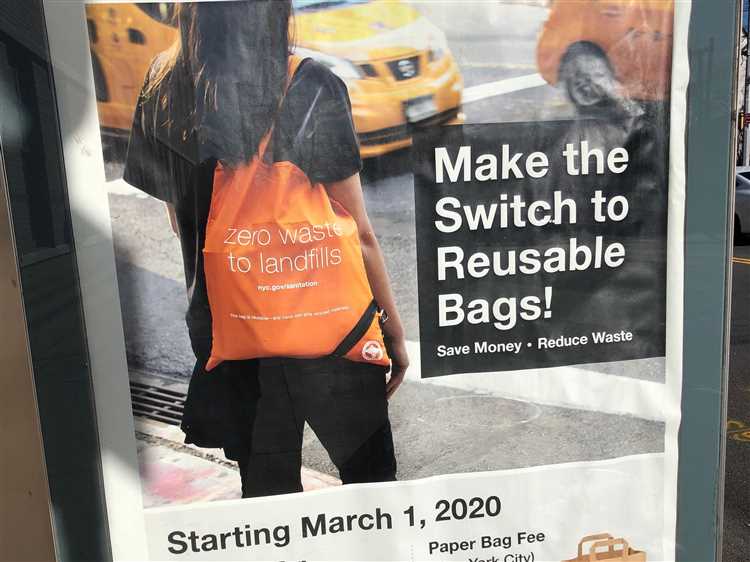
In recent years, there has been a growing global movement to reduce the consumption of single-use plastic items in an effort to combat the escalating environmental crisis. One such item that has attracted significant attention is the plastic bag. These bags, which are commonly used for carrying groceries and other goods, have come under scrutiny due to their harmful impact on the environment.
New York, as a progressive and environmentally conscious city, has been at the forefront of this movement. In an effort to reduce plastic waste and promote more sustainable alternatives, New York lawmakers have been pushing for a ban on plastic bags.
The proposed legislation aims to prohibit the distribution of most single-use plastic bags in the state, both at retail stores and grocery outlets. The ban would encourage consumers to bring reusable bags when shopping, ultimately reducing the number of plastic bags ending up in landfills or polluting our oceans.
While the ban has faced some opposition from certain groups, many see it as a necessary step towards a greener future. The impact of plastic pollution on wildlife and ecosystems has been well-documented, and banning plastic bags is seen as a meaningful way to mitigate this issue.
- Plastic Bags: The Ban Debate in New York
- The Argument Against Plastic Bags
- The Counterargument
- The Environmental Impact
- Proponents of the Ban
- Reducing Resource Consumption
- Success in Other Locations
- Opponents of the Ban
- 1. Business owners:
- 2. Environmentalists:
- The Current Status and Potential Timeline
- Opposition and Challenges
- Implementation and Education
- Alternatives to Plastic Bags
- Global Initiatives Against Plastic Waste
- The Ocean Cleanup
- The Plastic Pollution Coalition
- Q&A
- Are plastic bags being banned in New York?
- Why are they banning plastic bags in New York?
- What are the alternatives to plastic bags in New York?
- When did the ban on plastic bags start in New York?
- What are the penalties for using plastic bags in New York?
- Why are plastic bags being banned in New York?
Plastic Bags: The Ban Debate in New York
Plastic bags have long been a popular choice for shoppers in New York City and throughout the state. They are lightweight, convenient, and often free of charge, making them a go-to option for carrying groceries and other purchases. However, the environmental impact of plastic bags has been a growing concern, leading to a heated debate over their use in New York.
The Argument Against Plastic Bags
Those in favor of banning plastic bags argue that they contribute to pollution and harm wildlife. Plastic bags are non-biodegradable, which means they do not break down naturally and can persist in the environment for hundreds of years. This has led to a significant increase in plastic waste in landfills and oceans, posing a threat to marine life. Additionally, plastic bags often end up as litter on city streets and in parks, creating an eyesore and causing harm to animals that mistake them for food.
Furthermore, opponents of plastic bags argue that their production and disposal have a negative impact on carbon emissions and energy consumption. Manufacturing plastic bags requires fossil fuels, and the process releases greenhouse gases into the atmosphere. Recycling plastic bags is also challenging and costly, with only a small percentage actually being recycled. A ban on plastic bags would promote the use of more sustainable alternatives like reusable bags, reducing waste and carbon emissions in the long run.
The Counterargument
On the other side of the debate, there are those who argue against banning plastic bags. They contend that plastic bags are affordable and convenient for many consumers, especially low-income households. The cost and availability of reusable bags can be a barrier for some, potentially placing a burden on those who rely on plastic bags for their everyday needs. Furthermore, opponents argue that a ban on plastic bags may not necessarily lead to a decrease in overall plastic consumption, as consumers may simply switch to other single-use plastic items instead.
Proponents of plastic bags also highlight the importance of personal choice and individual responsibility. They believe that education and awareness campaigns about reducing plastic waste would be more effective than an outright ban. Encouraging consumers to voluntarily opt for reusable bags or bring their own bags when shopping would allow for a more gradual transition away from plastic bags.
In conclusion, the ban on plastic bags in New York has sparked a heated debate with valid arguments on both sides. While the environmental concerns associated with plastic bags are significant, the potential impact on consumers and the overall effectiveness of a ban need to be carefully considered. The decision ultimately lies with policymakers and the community to strike a balance between environmental responsibility and consumer convenience.
The Environmental Impact
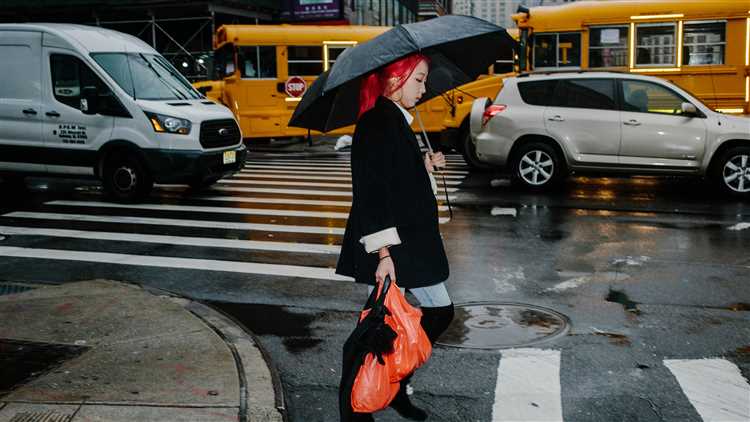
Plastic bags are a significant environmental issue in New York City. They contribute to many negative impacts on the environment, including pollution, waste, and harm to wildlife.
Pollution: Plastic bags are not biodegradable, which means they cannot break down naturally over time. Instead, they can persist in the environment for hundreds of years. When plastic bags are improperly disposed of, they can end up in water bodies, where they can pose a threat to marine life. They can also clog drains and contribute to flooding during heavy rainfall.
Waste: New York City consumes a tremendous amount of plastic bags every day. These bags often end up in landfills, taking up valuable space and contributing to the growing waste problem. By reducing the use of plastic bags, the city can make a significant positive impact on waste management and reduce the need for new landfill sites.
Harm to wildlife: Marine animals and birds often mistake plastic bags for food, leading to ingestion and subsequent health problems or death. Additionally, animals can become entangled in plastic bags, impairing their ability to move, feed, and breathe. By banning plastic bags, New York City aims to protect its diverse wildlife and ensure a healthier ecosystem.
Alternative solutions: As an alternative to plastic bags, reusable bags made from durable materials like cloth or canvas are encouraged in New York City. These bags can be used repeatedly, reducing waste and the need for single-use plastics. Additionally, some stores offer paper bags as an alternative, which are more easily recyclable than plastic bags.
In conclusion, the environmental impact of plastic bags in New York City is significant. By implementing a ban on plastic bags and promoting the use of reusable alternatives, New York City aims to mitigate pollution, reduce waste, protect wildlife, and create a more sustainable future.
Proponents of the Ban
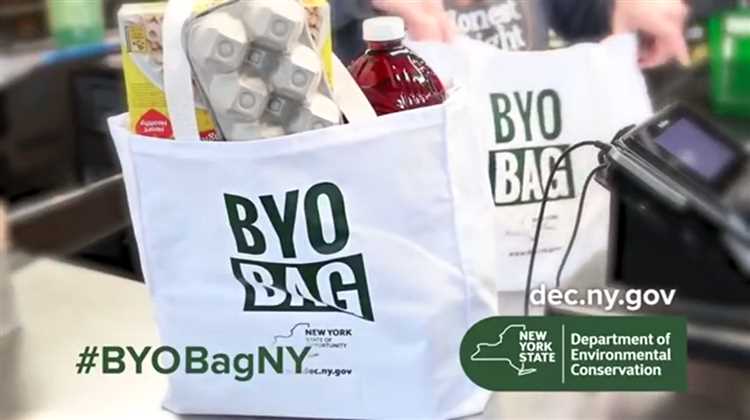
Supporters of the plastic bag ban in New York argue that the measure is necessary to protect the environment and reduce waste. They point out that plastic bags are one of the leading causes of pollution, as they are not biodegradable and can take hundreds of years to break down.
Furthermore, proponents argue that plastic bags are a major contributor to ocean pollution and harm marine life. Many marine animals mistake plastic bags for food and end up ingesting them, leading to severe health problems or even death. By banning plastic bags, advocates believe that New York can help protect its coastal ecosystems and the diverse species that inhabit them.
In addition to environmental concerns, supporters of the ban also highlight the economic benefits it can bring. They argue that by encouraging the use of reusable bags, the ban will spur the production and sale of alternative, more sustainable bag options. This can create new jobs and stimulate local economies, while also reducing the reliance on fossil fuel-intensive plastic bag production.
Reducing Resource Consumption
Another argument put forth by advocates of the ban is that it can help to conserve valuable resources. Plastic bags are made from non-renewable sources such as oil and gas, which require significant energy to extract and process. By replacing plastic bags with reusable options, the demand for these finite resources can be reduced, leading to a more sustainable use of natural resources.
Furthermore, proponents emphasize the importance of individual responsibility in tackling environmental issues. They believe that by encouraging consumers to bring their own bags or purchase reusable ones, the ban can foster a culture of sustainability and raise awareness about the impact of plastic waste on the planet.
Success in Other Locations
Advocates of the ban also point to the success of similar measures in other cities and countries as evidence of its effectiveness. They argue that cities like San Francisco and countries like Ireland and Bangladesh, which have implemented plastic bag bans, have seen significant reductions in plastic bag usage and related pollution. By following in their footsteps, supporters believe that New York can achieve similar positive outcomes.
In conclusion, proponents of the plastic bag ban in New York argue that it is necessary to protect the environment, reduce waste, and promote a sustainable and responsible consumer culture. They believe that by implementing the ban, New York can contribute to global efforts to combat plastic pollution and create a more environmentally friendly future.
Opponents of the Ban
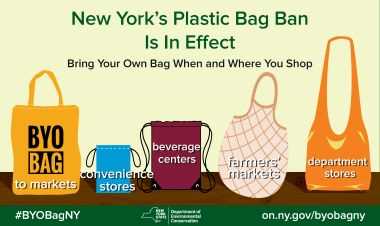
While the plastic bag ban in New York has gained significant support, it has also faced opposition from various groups and individuals who believe that the ban is unnecessary or will have negative consequences.
1. Business owners:
Many small business owners argue that the plastic bag ban will impose additional costs on them. They claim that alternative options such as paper bags or reusable bags are more expensive to purchase, resulting in a financial burden for businesses. Some business owners also argue that customers prefer plastic bags for their convenience and that banning them might lead to a decrease in sales.
2. Environmentalists:
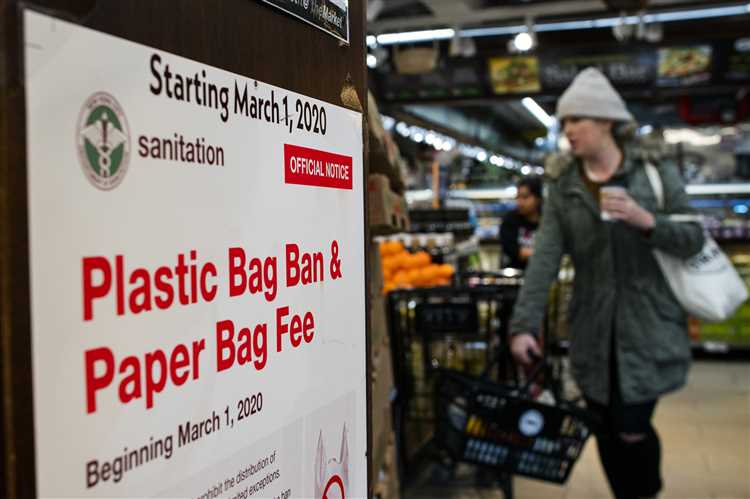
Surprisingly, some environmentalists are also opposed to the plastic bag ban. They argue that banning plastic bags might have unintended negative environmental consequences. These opponents point out that compared to other forms of packaging, plastic bags have a smaller carbon footprint and require fewer resources to produce and transport. They argue that the ban might actually lead to an increase in the consumption of paper bags, which have their own environmental impact.
Despite these opposing views, proponents of the ban argue that the long-term environmental benefits of reducing plastic waste outweigh the short-term concerns raised by opponents. They believe that a shift towards reusable bags and alternative forms of packaging is necessary to address the significant problem of plastic pollution in New York and around the world.
The Current Status and Potential Timeline
The push to ban plastic bags in New York has gained significant momentum in recent years. The current status of the ban is that it has been signed into law and is set to take effect on March 1, 2020. This means that starting from that date, businesses in New York will no longer be allowed to distribute single-use plastic bags to their customers.
However, it is important to note that there are exceptions to this ban. Certain types of plastic bags will still be allowed, such as those used for packaging raw meat, fish, or poultry, as well as those used for bulk items or prescription drugs. Additionally, the ban will not apply to plastic bags used by customers for non-prepackaged items, such as fruits, vegetables, or bakery goods.
The potential timeline for the ban in New York began in 2017 when the idea was first introduced as part of an effort to reduce plastic waste and protect the environment. After several years of discussions and negotiations, the ban was finally passed by the New York State Legislature and signed into law by Governor Andrew Cuomo in April 2019.
Opposition and Challenges
While the ban has received widespread support from environmental activists and many residents of New York, it has also faced opposition and challenges from various groups. Some argue that banning plastic bags will disproportionately affect low-income communities, who may rely on the convenience and affordability of plastic bags. Others argue that banning plastic bags is not enough to address the larger issue of plastic pollution, and that more comprehensive measures should be taken instead.
Implementation and Education
In preparation for the ban, the New York State Department of Environmental Conservation has been working to educate businesses and the public about the upcoming changes. They have provided guidance and resources to help businesses transition to alternative options, such as reusable bags or paper bags. Additionally, outreach efforts have been made to inform the public about the reasons behind the ban and the importance of reducing plastic waste.
| Date | Milestone |
|---|---|
| April 2019 | The ban on plastic bags is signed into law by Governor Andrew Cuomo. |
| March 1, 2020 | The ban is set to take effect, prohibiting businesses from distributing single-use plastic bags. |
| Ongoing | The New York State Department of Environmental Conservation continues to educate businesses and the public about the ban and promote alternative options for carrying goods. |
Alternatives to Plastic Bags
With the increasing concern over the environmental impact of plastic bags, it is important to explore alternative options. Fortunately, there are several alternatives to plastic bags that are both sustainable and convenient. Here are some of the most popular choices:
- Reusable Bags: One of the best alternatives to plastic bags is using reusable bags. These bags are typically made of durable materials such as canvas, nylon, or jute, and can be used multiple times. Many stores offer reusable bags for sale, and some even offer incentives for customers who bring their own bags.
- Paper Bags: Paper bags are another option to consider. While they are not as durable as reusable bags, they are biodegradable and can be recycled. Some stores offer paper bags as an alternative to plastic bags, although it is important to keep in mind that the production of paper bags also has an environmental impact.
- Biodegradable Bags: Biodegradable bags are made from materials that can break down naturally over time. These bags are designed to decompose in composting conditions, reducing the environmental harm caused by plastic bags. However, it is important to note that not all biodegradable bags are created equal, so it is essential to look for certifications that confirm the bags’ biodegradability.
- Cloth Bags: Cloth bags, also known as tote bags, are another eco-friendly alternative. They are typically made of natural fibers such as cotton or hemp, and they can be reused many times. Cloth bags come in various shapes, sizes, and designs, making them a stylish and sustainable option.
When choosing an alternative to plastic bags, it is essential to consider the specific needs and uses. By replacing plastic bags with sustainable alternatives, individuals can contribute to protecting the environment and reducing pollution.
Global Initiatives Against Plastic Waste
Plastic waste has become a major environmental concern worldwide, prompting governments, organizations, and individuals to take action. Several global initiatives have been established to combat the problem of plastic waste and reduce its impact on our planet.
The Ocean Cleanup
One notable initiative is The Ocean Cleanup, a non-profit organization that is devoted to developing advanced technologies to remove plastic from the world’s oceans. Their most prominent project involves the deployment of a floating system that passively collects plastic debris. This innovative solution aims to clean up the Great Pacific Garbage Patch, a massive collection of floating plastic waste.
The Plastic Pollution Coalition
The Plastic Pollution Coalition is a global alliance of organizations, individuals, and businesses working towards a plastic-free future. They raise awareness about the harmful effects of plastic pollution and promote sustainable alternatives. Through campaigns and educational programs, they advocate for reducing plastic consumption and encouraging recycling.
Other global initiatives include:
- The United Nations Environment Programme’s Clean Seas Campaign, which aims to eliminate major sources of marine plastic pollution.
- The Ellen MacArthur Foundation’s New Plastics Economy initiative, which seeks to reshape the global plastics system to promote circular economy principles.
- The Break Free From Plastic movement, which brings together NGOs, businesses, and individuals to demand lasting solutions to the plastic pollution crisis.
These initiatives highlight the urgency and importance of tackling plastic waste on a global scale. By working together, we can make a significant impact and create a sustainable future for generations to come.
Q&A
Are plastic bags being banned in New York?
Yes, plastic bags are being banned in New York. In March 2020, the ban on single-use plastic bags went into effect across the state, including New York City.
Why are they banning plastic bags in New York?
Plastic bags are being banned in New York to reduce plastic waste and protect the environment. Single-use plastic bags are not biodegradable and contribute to pollution and harm wildlife. By banning plastic bags, the aim is to encourage the use of reusable bags and promote more sustainable alternatives.
What are the alternatives to plastic bags in New York?
There are several alternatives to plastic bags in New York, including reusable cloth bags, paper bags, and compostable bags made from materials like cornstarch. Many businesses also sell their own branded reusable bags for customers to purchase and use.
When did the ban on plastic bags start in New York?
The ban on plastic bags in New York officially started on March 1, 2020. This means that single-use plastic bags are no longer allowed to be distributed by most retailers across the state, including in New York City.
What are the penalties for using plastic bags in New York?
In New York, there are no penalties for individuals using plastic bags. However, businesses can face fines if they continue to distribute single-use plastic bags after being warned. The exact penalties vary depending on the number of offenses and can range from $250 to $500 per incident.
Why are plastic bags being banned in New York?
Plastic bags are being banned in New York because they have a negative impact on the environment. They take years to decompose and often end up in landfills or as litter, causing harm to wildlife and polluting our oceans. Banning plastic bags is a way to encourage people to use more sustainable alternatives like reusable bags.